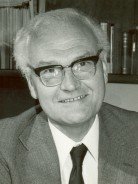

Happy the man who finds his true love at an early age and remains true to that love after more than a half a century. Such a man is Professor Lord Lewis of Newnham Lord Lewis chose Chemistry over all others for what you might call all the "wrong" reasons or all the "right" ones: he had a very inspiring Chemistry teacher at school. The love of Chemistry became the basis of a most illustrious career. And even now his ardour for research and teaching remains unabated. He combines this with a commendable zeal for public service.
Even a casual glance at Lord Lewis' Curriculum Vitae leaves one reeling from the thought of his boundless energy and superior intellect. Indeed it speaks for itself as to his internationally recognised academic qualifications and reputation. A mere summary of his achievements in Who's Who is of formidable length. He has degrees from London, Nottingham, Manchester and Cambridge, including a DSc from London and a ScD from Cambridge.
"Let those teach others who themselves excel". Lord Lewis himself certainly excelled at his studies and just as he himself was inspired by his chemistry teacher, Lord Lewis set out to inspire other young minds after obtaining his PhD from Nottingham University in 1952. He taught at the University of Sheffield, Imperial College, London, and University College, London, before becoming Professor of Chemistry at the University of Manchester in 1961. He returned as Professor of Chemistry to University College in 1967, and in 1970 became Professor of Chemistry at Cambridge University, where he taught until his retirement in 1995. In 1975 he became Warden of Robinson College, Cambridge, a post which he still holds today. Though today he has applied his mind to wide-ranging community issues Lord Lewis still enjoys teaching Chemistry and does so as Visiting Professor at University College.
Lord Lewis recalls high points in his career as an inorganic chemist: in the 1950s and 60s he experienced the excitement of new applications of magnetism in chemistry, and another big area was "cluster chemistry" which involved the building of molecules. Research in itself is an infinite source of joy and fulfilment: Lord Lewis's greatest ambition is to be able to spend another twenty years in research. With him, to use the words of Laurence Sterne "the desire of knowledge, like the thirst of riches, increases ever with the acquisition of it". He feels strongly that research and teaching must go together, the one enhancing the other in a mutually beneficial synergy.
It may be worth noting the number of books, papers and review articles produced by Lord Lewis and the number of PhD students trained by him: two books, 800 papers published in international chemistry journals and eighty PhD's. A happy coincidence? Or does Lord Lewis know that Hong Kong people regard two and eight as propitious numbers?
He is fairly certain that the majority of problems in the physical sciences will be solved fairly quickly. What particularly interests him now are borderline areas in the sciences, interdisciplinary areas, for example, Biology and Chemistry. While he manifests great enthusiasm for science Lord Lewis realises that science is not the panacea for all human ills, that the quality of life depends also on the development of literature and the arts.
Montaigne has said that "science without conscience is the death of the soul". Lord Lewis has a very strong social conscience. Increasingly he has become involved with problems relating to the environment. He devotes a great deal of time and energy to ecological issues, recognising the commonality of these problems the world over. He is very active on the Sub-Committee for the Environment of the House of Lords European Communities Committee, which meets once a week to scrutinise European problems. In addition he has served, and is serving on a large number of high-level committees and commissions: he is the UK Representative on the NATO Science Committee, Chairman of the Executive Committee of the Cambridge Overseas Trust; he has served as Chairman of the Royal Commission on Environmental Pollution. A Fellow of the Royal Society, he served as its Vice-President between 1983 and 1984, and as the President of the Royal Society of Chemistry from 1986 to 1988. I will not attempt anything like an exhaustive list.
I have so far been focusing on Lord Lewis the scientist, the public figure. No citation should leave out a eulogy to Lord Lewis the man. Allow me to quote from the Auden passage once more. Auden has written that "poetry cannot celebrate" scientists, "because their deeds are concerned with things, not persons..." Lord Lewis is very much concerned with persons. He enjoys his interaction with the young people in his charge.
Mr Pro-Chancellor, in recognition of his contribution, I call upon you to confer upon Professor Lord Lewis of Newnham the degree of Doctor of Science honoris causa.
Citation written and delivered by Professor Mimi Chan Mei Mei, the Public Orator.



